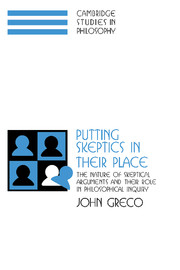
-
Select format
-
- Publisher:
- Cambridge University Press
- Publication date:
- November 2009
- May 2000
- ISBN:
- 9780511527418
- 9780521772631
- 9780521045537
- Dimensions:
- (228 x 152 mm)
- Weight & Pages:
- 0.55kg, 282 Pages
- Dimensions:
- (228 x 152 mm)
- Weight & Pages:
- 0.425kg, 284 Pages
- Subjects:
- Philosophy: General Interest, Logic, Philosophy
- Series:
- Cambridge Studies in Philosophy
You may already have access via personal or institutional login- Subjects:
- Philosophy: General Interest, Logic, Philosophy
- Series:
- Cambridge Studies in Philosophy
Book description
This book, first published in 2000, is about the nature of skeptical arguments and their role in philosophical inquiry. John Greco delineates three main theses: that a number of historically prominent skeptical arguments make no obvious mistake, and therefore cannot be easily dismissed; that the analysis of skeptical arguments is philosophically useful and important, and should therefore have a central place in the methodology of philosophy; and that taking skeptical arguments seriously requires us to adopt an externalist, reliabilist epistemology. Greco argues that the importance of skeptical arguments is methodological. It is further argued that taking skeptical arguments seriously requires us to adopt a version of 'virtue epistemology', or a theory of knowledge that makes intellectual virtue central in the analysis of knowledge. The above methodology has consequences for moral and religious epistemology; in particular, a theory of moral perception is defended.
Reviews
"...an important book...Greco's writing is crystal clear and the volume is well organized. It is impossible to get lost in a chapter and easy to see how each chapters fits into the progression of the essay. Furthermore, the volume is attractively produced with clean printing, notes at the foot, a solid bibliography, and a reasonable index." Philosophical Review
"Greco's book stands out...as one of the best books on skepticism in the last twenty years, earning it a place alongside Stroud's masterful The Significance of Philosophical Scepticism and Williams's already-lauted Unnatural Doubts. Any serious epistemologist, of any stripe or persuasion, would be benefited by reading it..." Review of Metaphysics
Contents
Metrics
Altmetric attention score
Full text views
Full text views help Loading metrics...
Loading metrics...
* Views captured on Cambridge Core between #date#. This data will be updated every 24 hours.
Usage data cannot currently be displayed.
Accessibility standard: Unknown
Why this information is here
This section outlines the accessibility features of this content - including support for screen readers, full keyboard navigation and high-contrast display options. This may not be relevant for you.
Accessibility Information
Accessibility compliance for the PDF of this book is currently unknown and may be updated in the future.


